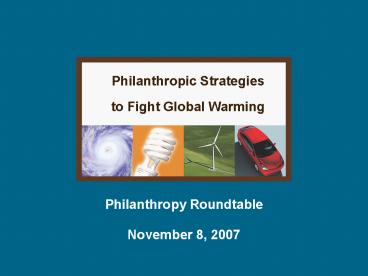Philanthropic Strategies - PowerPoint PPT Presentation
1 / 20
Title:
Philanthropic Strategies
Description:
The William and Flora Hewlett Foundation. The David and ... Wendy and Eric Schmidt. Elizabeth Simons and Mark Heising. Nat Simons and Laura Baxter-Simons ... – PowerPoint PPT presentation
Number of Views:67
Avg rating:3.0/5.0
Title: Philanthropic Strategies
1
TITLE PAGE
Philanthropic Strategies to Fight Global Warming
Philanthropy Roundtable November 8, 2007
2
ENERGY FOUNDATION PARTNERS
Foundations (7) 50 million per year
- The William and Flora Hewlett Foundation
- The David and Lucile Packard Foundation
- The Doris Duke Charitable Foundation
- The McKnight Foundation
- The MacArthur Foundation
- The Pew Charitable Trusts
- The Mertz Gilmore Foundation
- Kate Greswold
- Randi and Robert Fisher
- Noel and Claire Perry
- Wendy and Eric Schmidt
- Elizabeth Simons and Mark Heising
- Nat Simons and Laura Baxter-Simons
Individuals (6) 10 million per year
3
VISION New Technology Can Solve Global Warming.
Energy efficiency and renewable energy enable
economic growth with dramatically less pollution.
4
Strategic Premise
- NEW TECHNOLOGIES can solve global warming.
- POLICY SHAPES ENERGY MARKETS, driving billions in
public and private investments. - TARGETED PHILANTHROPIC INVESTMENT CAN CHANGE
POLICY, accelerating clean technology adoption.
5
Case Study Wind Power
The United States is the fastest-growing market
in the world for wind power.
- António Mexia, CEO of Energías de Portugal
State policies driving 30 billion market Created
and promoted by NGOs
6
Climate Change A Philanthropic Imperative
- Climate is ideally suited for philanthropy.
- Invest in solutions to address the underlying
challenge reinventing the energy industry. - Develop and promote policy change
- Build public support
7
States Leading On Global Warming
Regional Greenhouse Gas Initiative members
Western Climate Initiative members and observers
Additional states with climate plans (recently
completed or in process)
8
Why Now?
- Warming of the climate system is unequivocal.
- Timing, magnitude of impacts uncertain - but
early indications are worrisome. - The world must turn around the carbon curve
between now and 2020-2030. - IEA 20 trillion to be invested in new energy
supplies by 2030. - States are the laboratoriesof democracy.
Low water at Hoover Dam, 2007
9
The worlds premier risk analysts
- We believe that the long-term stability of our
economy depends on an appropriate response to
climate change - We support national and global emissions
reduction targets - We support government action, including
regulation. - ClimateWise, a group of 38 major insurers
10
Californias Boldest Move AB 32
Source Schwarzenegger Climate Action Team
11
Already Greener than the Rest
12
California Efficiency History of Success
Efficiency average cost 2-3/kWh 5.3 billion in
net benefits in last 10 years
13
California Clean Cars - Sweeping the Nation
gt30 of market gt150 MtCO2/yr by 2030 30 carbon
reduction by 2019 25B net consumer savings in
2020
Biggest driver worldwide for new technology
14
Driving Cleantech Investment
- California secured 2.1 billion, or 26 percent
of the total clean technology funding for North
America (2001-2006). - 91 percent of venture capitalists say
pro-environment policies are a significant
factor.
15
Priorities
- Put a price on carbon
- Drive investment in low-carbon technologies
- Prevent investment in high-carbon technologies
- Gain experience with a range of policies
- Win federal policy
- Secure international policy
16
TITLE PAGE
Can We Scale? Design To Win Study
17
Prioritizing Worldwide Philanthropic Strategies
for Global Warming
JOINT STUDY DESIGN TO WIN
Energy Foundation Hewlett Foundation Packard
Foundation Oak Foundation Doris Duke Charitable
Foundation
18
THREE PHASES
Define Win Scenario Meta-analysis of Science
Formulate Solutions Packages Policy,
Finance,Education
Prioritize Philanthropic Investment
Options Carbon avoided/ invested
19
THE WIN 50 REDUCTION BY 2030
2030 emission reduction potential by sector
GtCO2e
2030 BAU emissions
Power
Industry
Buildings
25
Transport
Forestry
Agriculture
Waste/
5
Unidentified
30
Target
2007
2030
Sources IPCC and USEPA, 2006 (2030 potentials)
20
PRELIMINARY CONCLUSIONS
- WE CAN DO THIS, but we have to move fast and on a
huge scale - FOCUS ON U.S, EU, CHINA, INDIA, 40 of
mitigation potential - AVOID LOCK IN of long-lived assets like coal
fired electric power plants, inefficient
buildings and inefficient industrial
infrastructure.































